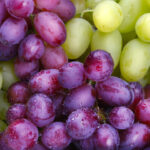The art of reengineering Chile's table grape industry

With 54,000 hectares from Atacama in the north to Maule in the south, table grapes represent 18% of Chile's fruit plantations, yielding 1.3 million metric tons (MT) each year with a value of US$1.6 billion. Despite being the world's top exporter of the fruit, the sector is losing profitability and competitiveness due to its old vines, a lack of labor supply and rising costs. In the face of this challenge, a group of local and international consultants formed the Research and Development Commission, Uvanova, with the aim of reengineering the sector.
Among its broad portfolio of tasks, Uvanova seeks to define productive strategies to reduce labor costs, increase the genetic pool of varieties and rootstocks, identify postharvest technologies and processes, and ensure the sustainability and safety of the field. 
"The grand objective of Uvanova is channeling or being the bridge between the real needs of growers and research, in order to increase productivity and hence the profitability of table grapes in Chile, Uvanova president Carolina Cruz told www.freshfruitportal.com.
"As consultants we cannot do the research itself - for that we have to find entities that help us in hard research. AT the moment our main partner is INIA (Agricultural Research Institute), but the invitation is there for all research organizations, whether they be universities or technological institutes that wish to participate," she said, adding that grower group Fedefruta was also providing support.
She said Uvanova aimed to be a platform for research extension.
"Change is made by many, not by a few. I hope that all the people or institutions who intend to participate will be able to start working together with us to make the research as wide as possible.
"These are new times, there are different forms of commercialization, the world is at a new stage in which moving table grapes requires a rethink of what we are doing as a grape-growing country."
Cruz explained this rethink had three main focal points. Firstly, she highlighted a necessary improvement in productivity through varietal conversion.
The second point relates to the use of increasingly scarce resources such as water and labor.
"In terms of the labor supply, the incorporation of new management systems, working with lower vineyards or with lower management systems, means people will be able to get better yields with a lower risk for accidents," she said, also emphasizing the importance of denser vineyards with fewer grapes per plant so that invested capital can be recovered earlier.
Finally, the third issue has to do with postharvest, covering packing as well as food safety.
"You can't forget that we are at the end of the world and we have to arrive in any market with our products in no less than 45 days, as even for the closest markets - given the certain instability we've experienced from port strikes - you have to prepare a product that is capable of coping with any problem that may arise," Cruz said.
"Before all these scenarios, what Uvanova wants is basically to bring research into all the previously mentioned areas and bring them down to the grower's problems. We want to help restore the joints of reengineering that Chile's table grapes need.
"We want to create a space that exposes these ideas and needs, and channels them through investigation."
PMA Fruittrade Latin America
Uvanova will be participating in the Produce Marketing Association (PMA) Fruittrade Latin America event, which is set to take place on Nov. 12-13 in Santiago, Chile.
In a session dedicated to table grapes, Uvanova will be discussing proposals, ideas and activities.
"Uvanova is in charge of a block about table grapes where firstly we'll be doing a presentation about who we are and our goals," Cruz said.
The session will also include expositions that seek to reflect Chile's situation in the global table grape industry, comparing to competitors and other grape-growing nations.
Specifically, the commission will discuss proposals including the use of plastics as a management tool to generate a product of quality, using balanced fertilization management.
Another big issue to be looked at will be the pest Lobesia Botrana and its control.
"We want to make this very wide, as an invitation to all who take part, especially growers. The project has them in mind, in order for them to feel involved in a research project aiming to improve their profitability," Cruz concluded.
Photo: www.shutterstock.com















































